#Dilgo Khyentse Rinpoche
Text
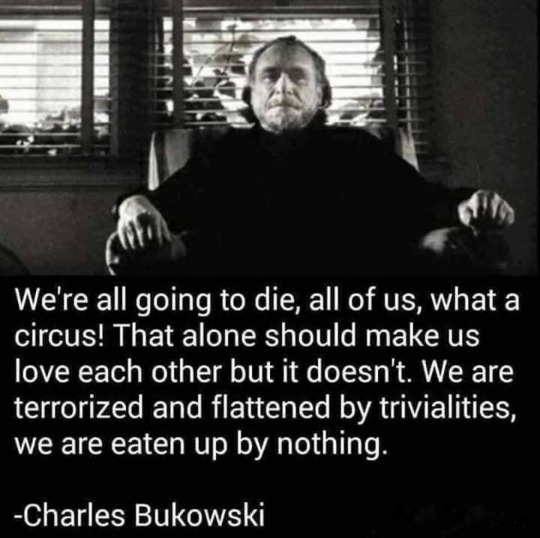
Those who seek happiness in pleasure, wealth, glory, power, and heroics are as naive as the child who tries to catch a rainbow and wear it as a coat.
~ Dilgo Khyentse Rinpoche
#Dilgo Khyentse Rinpoche#Padmasambhava#Guru Rinpoche#buddha#buddhist#buddhism#dharma#sangha#mahayana#zen#milarepa#tibetan buddhism#thich nhat hanh#four noble truths#manjushri#amitaba buddha#avalokitesvara#green tara#tantric#vajrasattva#vajrapani#rainbow body#bodhisattva#buddha samantabhadra
39 notes
·
View notes
Text
"Remain in the simplicity of the present moment."
- Dilgo Khyentse Rinpoche
14 notes
·
View notes
Text
Experiences are like mist: they will fade away.
As it is said, experiences are like rainbows, but the great meditator who runs after them like a child will be deceived.
Such experiences in most cases give rise to hope and expectation. They are none other than the tricks of demons: they simply cause obstacles.
When true realization dawns in one's mind, it is like the king of mountains, Mount Meru, which no wind can shake.
Dilgo Khyentse Rinpoche
2 notes
·
View notes
Text
It is our mind, and that alone, that chains us or sets us free. Dilgo Khyentse Rinpoche
6 notes
·
View notes
Photo

"When a rainbow appears vividly in the sky, you can see its beautiful colors, yet you could not wear it as clothing, or put it on as an ornament. It arises through the conjunction of various factors, but there is nothing about it that can be grasped. Likewise, thoughts that arise in the mind have no tangible existence or intrinsic solidity. There is no logical reason why thoughts, which have no substance, should have so much power over you, nor is there any reason why you should become their slave."
~ Dilgo Khyentse Rinpoche
[Ian Sanders]
16 notes
·
View notes
Text
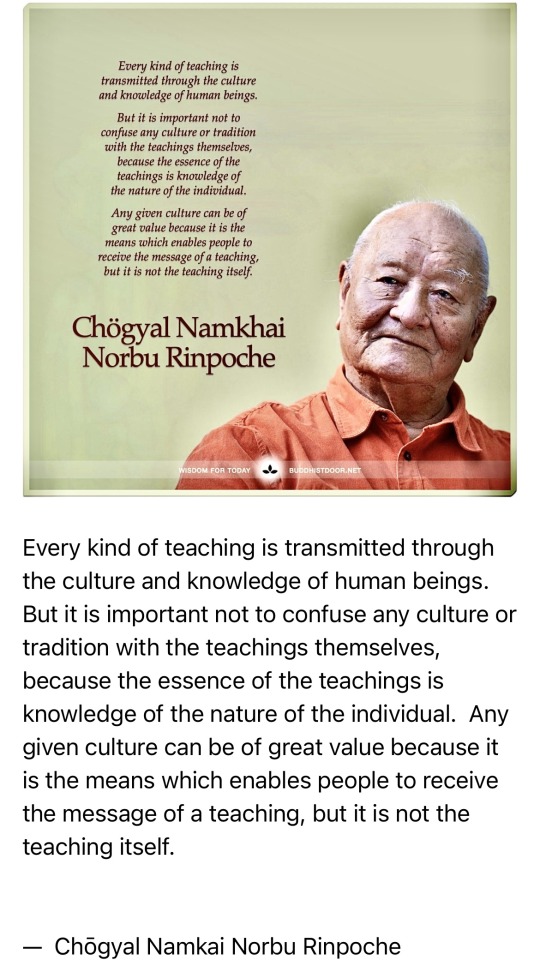
Namkhai Norbu (Tibetan: ནམ་མཁའི་ནོར་བུ་, Wylie: nam mkha’i nor bu; 8 December 1938 – 27 September 2018) was a Tibetan Buddhist master of Dzogchen and a professor of Tibetan and Mongolian language and literature at Naples Eastern University. He was a leading authority on Tibetan culture, particularly in the fields of history, literature, traditional religions (Tibetan Buddhism and Bon), and Traditional Tibetan medicine, having written numerous books and scholarly articles on these subjects.
•
•
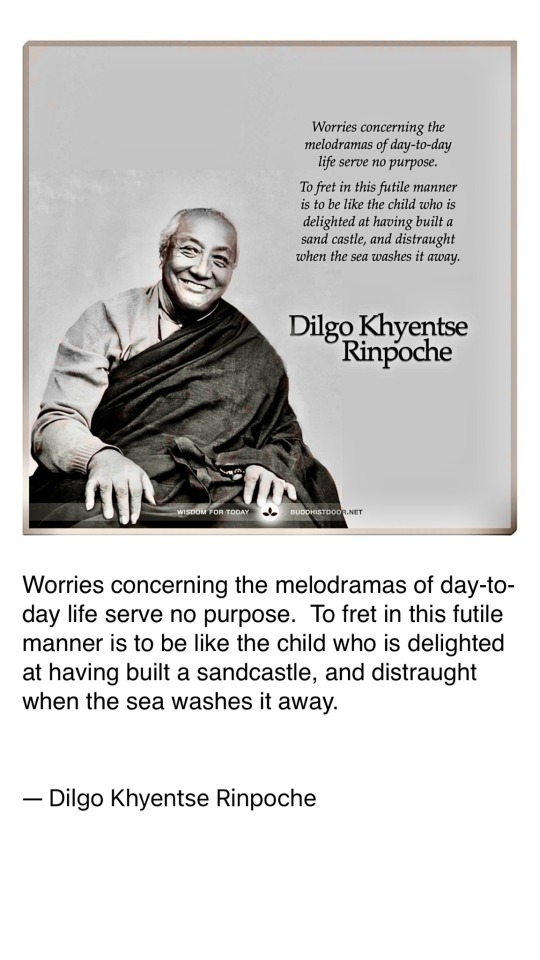
Tashi Paljor, Dilgo Khyentse Rinpoche (Tibetan: དིལ་མགོ་མཁྱེན་བརྩེ་, Wylie: dil mgo mkhyen brtse) (c. 1910 – 28 September 1991) was a Vajrayana master, scholar, poet, teacher, and recognized by Buddhists as one of the greatest realised masters. Head of the Nyingma school of Tibetan Buddhism from 1988 to 1991, he is also considered an eminent proponent of the Rime tradition.
•
•
🔔 Wisdom for Today - Buddhistdoor Global: Teachings from the world of Buddhism and beyond, updated each weekday:
☸️ BDG • Buddhist Door Global website:
•
#Buddism#Mahāyāna Buddhism#Tibetan Buddhism#Chögyal Namkhai Norbu Rinpoche#Dzogchen meditation tradition of Tibetan Buddhism#Dilgo Khyentse Rinpoche#Vajrayana tradition of Tibetan Buddhism#Rime tradition of Tibetan Buddhism
1 note
·
View note
Quote
Non ingombratevi la mente di pensieri inutili. A cosa serve rimuginare sul passato, anticipare il futuro? Dimorate nella semplicità del momento presente.
Dilgo Khyentse Rinpoche
0 notes
Text
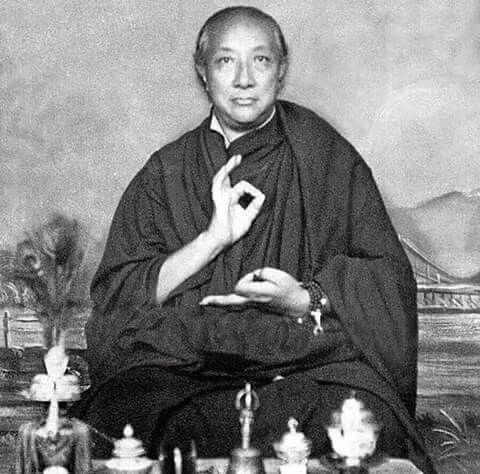
“It is completely natural that thoughts keep on arising. The point is not to try to stop them, which would be impossible anyway, but to liberate them. This is done by remaining in a state of simplicity, which lets thoughts arise and vanish again without stringing onto them any further thoughts. When you no longer perpetuate the movement of thoughts, they dissolve by themselves without leaving any trace. When you no longer spoil the state of stillness with mental fabrications, you can maintain the natural serenity of mind without any effort. Sometimes, let your thoughts flow, and watch the unchanging nature behind them. Sometimes, abruptly cutting the flow of thoughts, look at naked awareness.”
— Dilgo Khyentse Rinpoche
65 notes
·
View notes
Text

Vajrasattva and Vajratöpa
The Hundred-Syllable Mantra of VajrasattvaTo meditate on Vajrasattva is the same as to meditate upon all the buddhas. His hundred-syllable mantra is the quintessence of all mantras. -Dilgo Khyentse Rinpoche
Vajrasattva’s mantra is a powerful purification prayer that invokes the mindstreams of all the buddhas. Khenpo Sherab Sangpo suggests that his students recite this mantra 21 times or more each day. We have collected various translations to help with your study. Additional resources can be found on Lotsawa House.
Sanskrit with English translation:
oṃ
Om is the supreme expression of praise.
vajrasattva samayam anupālaya vajrasattva
Vajrasattva, ensure your samaya remains intact.
tvenopatiṣṭha dṛḍho me bhava
Be steadfast in your care of me.
sutoṣyo me bhava
Grant me unqualified contentment.
supoṣyo me bhava
Enhance everything that is noble within me.
anurakto me bhava
Look after me.
sarvasiddhiṃ me prayaccha
Grant me all accomplishments,
sarvakarmasu ca me
And in everything I do
cittaṃ śreyaḥ kuru
Ensure my mind is virtuous.
hūṃ
The hūṃ syllable is Vajrasattva’s wisdom mind.
ha ha ha ha
These represent the four immeasurables, the four empowerments, the four joys, and the four kāyās.
hoḥ
What joy!
bhagavan sarvatathāgatavajra
Blessed One, who embodies all the tathāgatas, Vajra(sattva),
mā me muñca
Never abandon me!
vajrī bhava
Grant me the realization of vajra nature!
mahāsamayasattva
Great samayasattva,
āḥ
I am one with you.
14 notes
·
View notes
Text
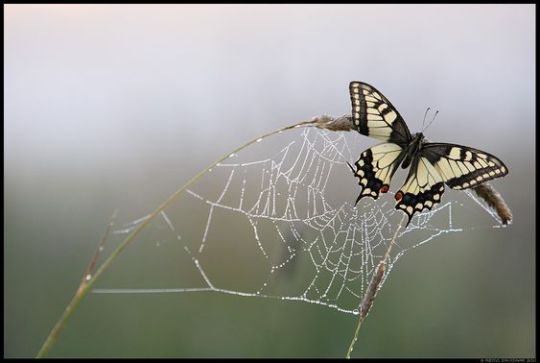
Life is fragile, like the dew hanging delicately on the grass, crystal drops that will be carried away on the first morning breeze.
~ Dilgo Khyentse Rinpoche
39 notes
·
View notes
Text
Never get angry, even with someone who has deliberately and maliciously harmed you. You should be grateful to such a person for helping you to purify past negative actions, to increase your determination to be free from samsara and to develop love and compassion.
-Dilgo khyentse rinpoche
15 notes
·
View notes
Text

"Throughout the day, put the teachings into practice. In the evening, examine what you have done, said, and thought during the day. Whatever was positive, dedicate the merit to all beings and vow to improve on it the next day. Whatever was negative, openly admit, and promise to repair it. In this way, the best practitioners progress from day to day, the middling practitioners from month to month, and the least capable from year to year."
- Kyabje Dilgo Khyentse Rinpoche
#Dilgo Khyentse Rinpoche#Padmasambhava#Guru Rinpoche#Longchenpa#four noble truths#amitaba buddha#buddha#buddhist#buddhism#dharma#sangha#mahayana#zen#milarepa#tibetan buddhism#thich nhat hanh#Avalokiteshvara#Dzogchen#vajrasattva#vajrapani#manjushri#buddha samantabhadra
28 notes
·
View notes
Text
"What good does it do to brood on the past or anticipate the future?"
- Dilgo Khyentse Rinpoche
0 notes
Quote
"To expect happiness without giving up negative action is like holding your hand in a fire and hoping not to be burned. Of course, no one actually wants to suffer, to be sick, to be cold or hungry - but as long as we continue to indulge in wrong doing we will never put an end to suffering. Likewise, we will never achieve happiness, except through positive deeds, words, and thoughts. Positive action is something we have to cultivate ourselves; it can be neither bought nor stolen, and no one ever stumbles on it just by chance."
~ Dilgo Khyentse Rinpoche
54 notes
·
View notes
Text
"Unless the inner forces of negative emotions are conquered, strife with outer enemies will never end."
--Dilgo Khyentse Rinpoche
5 notes
·
View notes
Text
Like a dog chasing a stick, a thought arises and off you go. I urge you to slow down and look at yourself. You have a perception and almost immediately there arises a thought. A thought, that if you trace it back, arises from an open field of awareness. Now ask yourself is the thought useful and skilled, does it reflect openness or is it selfish, critical and unskilled? Be a lion that fearlessly rests on the open field. Chasing a stick is not even considered.
Dilgo Khyentse Rinpoche
65 notes
·
View notes